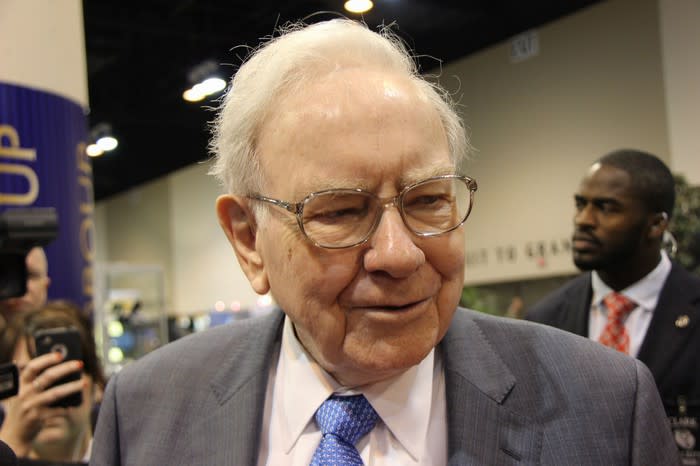Better Buy: Berkshire Hathaway vs. Wells Fargo
There's a solid case to be made that conglomerate Berkshire Hathaway (NYSE: BRK-A)(NYSE: BRK-B) and banking giant Wells Fargo (NYSE: WFC) are both trading for steep discounts. Berkshire has been targeted by hedge fund managers and even Warren Buffett himself as undervalued recently, and Wells Fargo is trading for its lowest valuation in years.
So, if you're looking to add financial sector exposure to your portfolio, these are definitely two stocks worthy of consideration. Here's a rundown of why these stocks look cheap right now, and which could be the better option.

Image source: Wells Fargo.
Wells Fargo is very cheap
There are some pretty big headwinds affecting bank stocks right now. Interest rates have been falling, which generally means lower interest margins for banks. And recession fears have been building, which could affect demand for loans and other banking services. As a result, the financial sector has been one of the worst-performing areas of the market recently, and Wells Fargo hasn't been spared. Through the first three weeks of August, Wells Fargo is down by nearly 8%.
However, it looks like Wells Fargo's business is actually performing quite well and the bank is doing a good job of moving on from its numerous scandals of recent years. In the second quarter, the bank's return on equity (ROE) of 13.3% and return on assets (ROA) of 1.31% represented a big improvement from a year ago, and as I wrote after the bank reported results, these are numbers that are once again starting to look like what we had come to expect from Wells Fargo before its scandals were revealed.
In addition, Wells Fargo's asset quality remains strong, and although the bank can't grow right now due to the penalty imposed by the Federal Reserve, I'd be surprised if this restriction doesn't get lifted sooner rather than later.
Despite its improvement and solid numbers, Wells Fargo is trading very cheaply. The stock yields more than 4.5% at the current price, and it's interesting to note that Wells Fargo's price-to-book valuation hasn't been this low since 2011 when we were in the wake of the financial crisis.
Berkshire Hathaway gives you exposure to several banks and more
As I mentioned, the banking sector woes weren't just confined to Wells Fargo. In fact, many big banks have fared even worse lately. Since Berkshire Hathaway owns a tremendous amount of bank stocks, this has been a negative catalyst for Berkshire as well. Berkshire's massive stakes in Wells Fargo, Bank of America, JPMorgan Chase, U.S. Bancorp, and others have been drags on the conglomerate.

Image source: The Motley Fool.
So if you think that the banking sector is looking cheap right now but don't necessarily want to commit to investing in any single bank, Berkshire could be a smart alternative. In addition to its bank stocks, Berkshire owns a collection of more than 60 subsidiary businesses and 40 common stock positions in a variety of industries, and if a recession does occur, Berkshire has an excellent track record of outperforming the market during the tough times.
On the topic of valuation, consider that Berkshire trades for just under $200 per Class B share as I write this. During the second quarter of 2019, Berkshire bought back roughly $400 million of its own stock at an average price of $201.50. During the first quarter, Berkshire bought back $1.7 billion in stock at an average price of $201.
Here's why this is important. Berkshire's buyback program allows the company to buy back stock only when both Warren Buffett and Vice Chairman Charlie Munger agree that it's trading for a substantial discount to its intrinsic value. Apparently both agreed that was the case at a price that was greater than its current share price.
Two great values, but which is the better buy now?
The takeaway is that after the financial sector headwinds of the past month or so, both Wells Fargo and Berkshire Hathaway look cheap. And to be perfectly clear, I don't necessarily think investors will go wrong with either of them.
Having said that, if I were going to buy one today, it would be Berkshire Hathaway. This is a recession-resistant business that tends to thrive during tough times. And the fact that Berkshire is carrying more cash on its balance sheet than ever before (over $122 billion) should only amplify Berkshire's advantage if a recession or further market turmoil does occur. And through Berkshire's roughly 10% stake in Wells Fargo, I'm happy to own the bank's stock indirectly for the time being.
Berkshire Hathaway has been a staple in my portfolio for years, and I don't see that changing anytime soon. In fact, if the sub-$200 prices persist, I may just add even more shares.
More From The Motley Fool
Matthew Frankel, CFP owns shares of Bank of America and Berkshire Hathaway (B shares). The Motley Fool owns shares of and recommends Berkshire Hathaway (B shares). The Motley Fool has the following options: long January 2021 $200 calls on Berkshire Hathaway (B shares) and short January 2021 $200 puts on Berkshire Hathaway (B shares). The Motley Fool has a disclosure policy.
This article was originally published on Fool.com

 Yahoo Finance
Yahoo Finance 